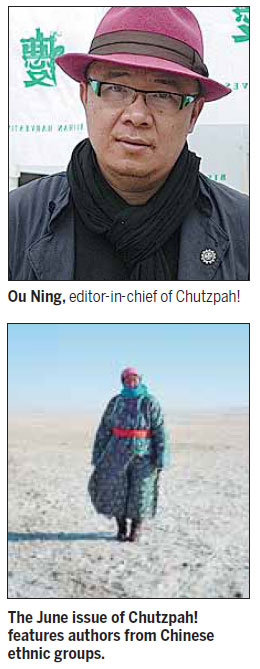To know the ethnic groups, read their prose
Updated: 2013-08-27 06:51
By Liu Jun (China Daily)
|
||||||||

Aydos Amantay, a young Kazak writer who grew up in Beijing, pulls the reader's heartstrings with his passionate confession about the loss of his cultural roots.
In his novella titled Loser, a university dropout returns to his hometown in Xinjiang Uygur autonomous region as a temporary volunteer teacher. The students offer him buttered naan bread dipped in milk tea, then they sing folk songs, holding hands in a tight circle.
Still, the teacher finds it hard to get back to his cultural roots, just as it is hard for him to pick up Kazak, or for his students to learn Mandarin.
But when an outsider sneers at them, the teacher finally stands up for his people.
Distinctive characters like these draw readers like a magnet to the 14th issue of the Chinese-English literary journal Chutzpah!
"Chutzpah" is a Yiddish word for audacious behavior. With the Chinese name Tian Nan, the bimonthly funded by Modern Media Group in April 2011 features original fiction, poetry and essays with sample translations in the section Peregrine.
The June issue presents 12 authors seeking their cultural roots including Amantay and Uygur author Alat Asem. Except for Shanghai-based Ren Xiaowen, whose novella Balcony is translated by Eleanor Goodman, all the others come from ethnic groups, telling stories from folklore, childhood and present life.
Mongolian author Baoerj Yuanye stands out with a superb sense of humor in the short tale of a wrestler's ritual on the grassland.
Ye Fu depicts his family and neighbors in diaojiaolou (a wooden building propelled on columns to keep the rooms dry) of the Tujia people; Na Zhangyuan recounts the plague looming in an unsuspecting Yi village; Shi Qinghui sends the narrator to bring justice to an uncle who died mysteriously in a Dong village.
Such stories are full of color and smell, sound and taste, for they are dipped in the happiness and sadness of the authors' real lives.
There are quite a few young writers who show a great gift in storytelling.
Pema Tseden, a Tibetan film director, proves himself just as gifted with the pen in the tale of a stranger looking for a woman named Choma. He never explains why, but pays anyone 100 yuan ($16) if they find Choma.
"On the surface, globalization can cause cultural assimilation, but the world's true nature lies in difference," says Ou Ning, editor-in-chief of Chutzpah!, in an e-mail interview.
An established poet and artist, Ou has traveled around the world as curator of many art exhibitions.
"In the context of China, the value of non-Han writers is that they construct difference through writing in minority languages, thus making the ethnic groups they represent a common subject of history."
liujun@chinadaily.com.cn
(China Daily USA 08/27/2013 page 9)

 Chinese navy starts escort mission at Gulf of Aden
Chinese navy starts escort mission at Gulf of Aden
 McGrady retires, considers career in China
McGrady retires, considers career in China
 Li Na breezes into US Open second round
Li Na breezes into US Open second round
 China and India set to resume military drills
China and India set to resume military drills
 Dwight Howard, Kai Ko promote fitness in Beijing
Dwight Howard, Kai Ko promote fitness in Beijing
 DC panda cub doing well
DC panda cub doing well
 Muslim Brotherhood leaders, Mubarak face trial
Muslim Brotherhood leaders, Mubarak face trial
 Cliff diving in the city
Cliff diving in the city
Most Viewed
Editor's Picks

|

|

|

|

|

|
Today's Top News
Nation must adjust when US tapers QE
Prosecutors seek heavy punishment for Bo Xilai
Pet abuse videos prompt outrage
China joins anti-tax fraud effort
UN to contact US over spying report
Foreigners nabbed for personal info trafficking
PLA Navy heads for routine drill in W.Pacific
Antitrust 'not target' foreign firms
US Weekly

|

|







